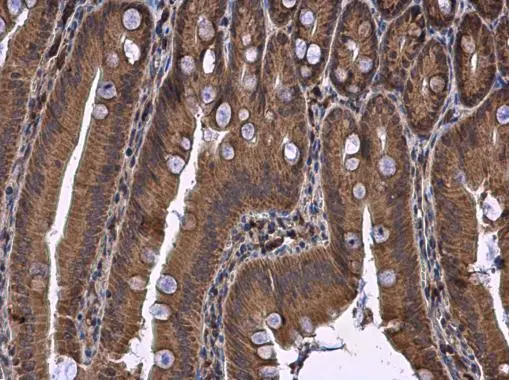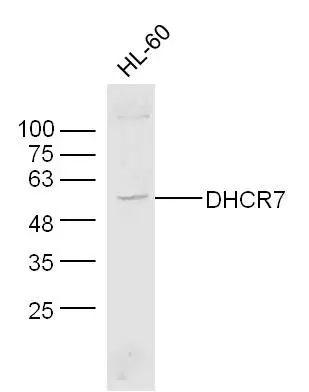
WB analysis of HL60 cell lysate using GTX51622 DHCR7 antibody. Dilution : 1:300
DHCR7 antibody
GTX51622
ApplicationsWestern Blot
Product group Antibodies
ReactivityHuman
TargetDHCR7
Overview
- SupplierGeneTex
- Product NameDHCR7 antibody
- Delivery Days Customer9
- Application Supplier NoteWB: 1:300-1000. *Optimal dilutions/concentrations should be determined by the researcher.Not tested in other applications.
- ApplicationsWestern Blot
- CertificationResearch Use Only
- ClonalityPolyclonal
- Concentration1 mg/ml
- ConjugateUnconjugated
- Gene ID1717
- Target nameDHCR7
- Target description7-dehydrocholesterol reductase
- Target synonymsSLOS, 7-dehydrocholesterol reductase, 7-DHC reductase, cholesterol-5,6-epoxide hydrolase subunit DHCR7, delta-7-dehydrocholesterol reductase, delta7-sterol reductase, putative sterol reductase SR-2, sterol delta-7-reductase, sterol reductase SR-2
- HostRabbit
- IsotypeIgG
- Protein IDQ9UBM7
- Protein Name7-dehydrocholesterol reductase
- Scientific DescriptionThis gene encodes an enzyme that removes the C(7-8) double bond in the B ring of sterols and catalyzes the conversion of 7-dehydrocholesterol to cholesterol. This gene is ubiquitously expressed and its transmembrane protein localizes to the endoplasmic reticulum membrane and nuclear outer membrane. Mutations in this gene cause Smith-Lemli-Opitz syndrome (SLOS); a syndrome that is metabolically characterized by reduced serum cholesterol levels and elevated serum 7-dehydrocholesterol levels and phenotypically characterized by mental retardation, facial dysmorphism, syndactyly of second and third toes, and holoprosencephaly in severe cases to minimal physical abnormalities and near-normal intelligence in mild cases. Alternative splicing results in multiple transcript variants that encode the same protein.[provided by RefSeq, Aug 2009]
- ReactivityHuman
- Storage Instruction-20°C or -80°C,2°C to 8°C
- UNSPSC41116161

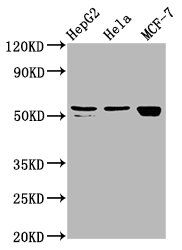
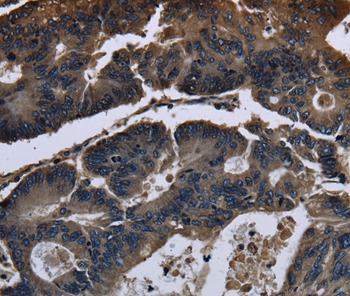


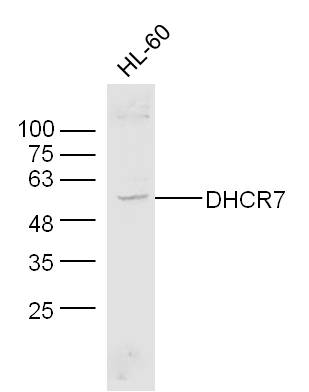

![Non-transfected (–) and transfected (+) Boiled and unboiled 293T whole cell extracts (30 μg) were separated by 10% SDS-PAGE, and the membrane was blotted with DHCR7 antibody [HL2764] (GTX639629) diluted at 1:5000. The HRP-conjugated anti-rabbit IgG antibody (GTX213110-01) was used to detect the primary antibody.](https://www.genetex.com/upload/website/prouct_img/normal/GTX639629/GTX639629_T-45292_20240315_WB_B_24031823_335.webp)
![Boiled and unboiled MCF-7 whole cell extract (30 μg) were separated by 10% SDS-PAGE, and the membrane was blotted with DHCR7 antibody [HL3685] (GTX641713) diluted at 1:1000. The HRP-conjugated anti-rabbit IgG antibody (GTX213110-01) was used to detect the primary antibody. (WCE: whole cell extract; ME: membrane extract)](https://www.genetex.com/upload/website/prouct_img/normal/GTX641713/GTX641713_T-45649_20250110_WB_Fraction_ub_25011618_521.webp)
